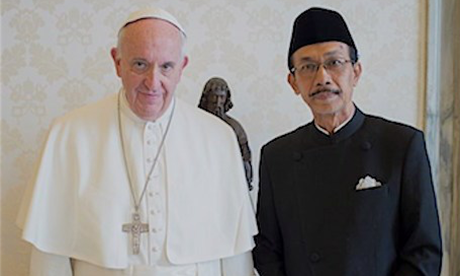There is a particularly good chance Pope Francis will visit Indonesia next year.
However, the Vatican has not released any official confirmation.
The Indonesian bishops want Francis to come for Asian Youth Day.
The 7th Asian Youth Day is taking place in Yogyakarta, a city on the island of Java, from July 30 to Aug. 6. 2017.
The Indonesian government would welcome a visit by the Pope as the new Indonesian ambassador to the Holy See Antonius Agus Sriyono, made clear when he presented his credentials to the pope on March 21.
Francis responded noncommittally, saying, “I would be happy to come to Indonesia if I could,” but his words were widely reported in Indonesia and are being interpreted in a positive sense.
In August last year the Indonesian minister of religious affairs Lukman Hakim Saifuddin invited Pope Francis to visit Indonesia to discuss various issues relating to peace and prevention of conflict between different religious followers.
“With all humbleness we invite Pope Francis to visit Indonesia,” the minister said when receiving Cardinal Pietro Parolin from the Vatican’s State Secretary at his office.
In February 2016, Jakarta Post reported Srivono as saying, ‘”Pope Francis plans to visit Indonesia in July 2017, coinciding with the Asian Youth Day when Indonesia serves as the host.”
There are other important reasons too why Indonesia is high on the list of possible venues for Francis’ next visit to Asia.
Indonesia has the world’s largest Muslim population.
Some 90 percent of its 270 million people are Muslim.
9 percent are Christian (Catholics count for over 3 percent, with 7.5 million faithful); most of the others are Buddhist (0.6 percent) or Kong Hu Chu (Confucian).
If Francis were to go to Indonesia, he would be the third pope to visit the country.
Paul VI went there in 1970 (and also visited Pakistan and seven other countries).
John Paul II arrived in 1989 and also went to East Timor, then a province of Indonesia but now an independent state—Timor-Leste, which has just celebrated the fifth centenary of its evangelisation and wants Francis to visit.
Although this is a majority-Muslim country, Indonesia is not an Islamic state; it is a pluralist society based on the Pancasila (Five Principles).
The first of these principles is belief in one supreme God.
The founding fathers Indoneisa which has 15,000 islands and 400 ethnic groups agreed that Indonesia is neither a secular nor a theocratic state.
Though various attempts have been made since independence in 1945 to impose Shariah law within the Constitution.
None have succeeded. Indonesia has experienced authoritarian rule at some periods since independence, but it remains a democracy.
Source
Additional readingNews category: Asia Pacific, Top Story.




